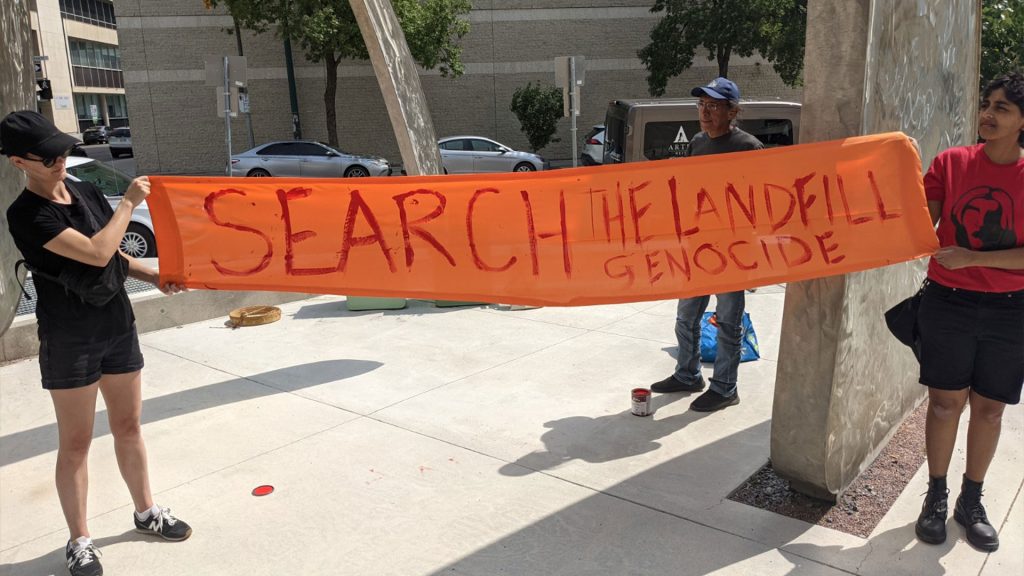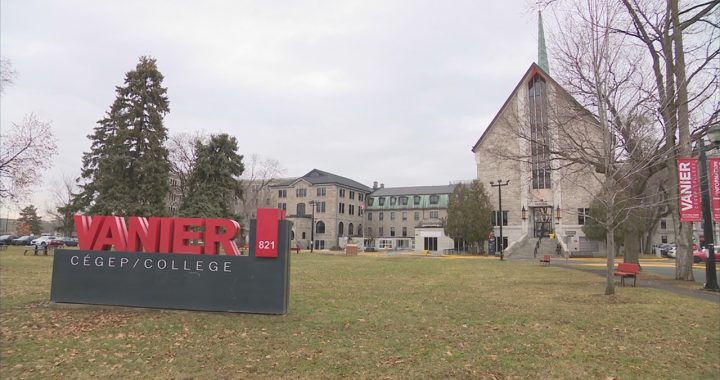
Demonstrators hold a banner outside the Winnipeg Law Courts building Thursday. Photo: Lisa Abel, APTN News
A Manitoba judge urged the two sides in a landfill blockade to try to reach a compromise Thursday, as the federal and Manitoba governments sparred over a proposed search for the remains of Indigenous women.
The city of Winnipeg is asking for a court injunction to remove a blockade that was set up at the city-run Brady Road landfill last week, after Manitoba Premier Heather Stefanson said the province would not support a search of the privately owned Prairie Green Landfill, which is north of the city.
The remains of Morgan Harris and Marcedes Myran are believed to be at Prairie Green. Jeremy Skibicki has been charged with first-degree murder in those deaths, as well as the deaths of Rebecca Contois, whose remains were found last year at Brady Road, and an unidentified woman Indigenous leaders are calling Buffalo Woman, whose remains have not been found.
Justice Sheldon Lanchbery heard arguments from the city and a lawyer for the protesters Thursday, adjourned the matter until Friday, and said the two sides might be able to find a compromise.
“Is there a way this matter may be resolved without court intervention at all, and could that be done today?” Lanchbery said.
Labour disputes
He pointed to a common practice in labour disputes, where picket lines slow traffic and protesters hand out pamphlets, but do not block traffic completely.
Lanchbery added that a compromise allowing the protesters to continue to highlight their concerns could be “in the true spirit of reconciliation.”
Sacha Paul, the lawyer for the protesters, told court his clients are exercising their right to free expression and the city has an alternate road it can use to access the landfill.
The city’s lawyer told court the right to free expression does not extend to shutting down an essential service. The alternate road is not built for high volumes of heavy traffic, she added, and has to shut down after rainfall.
Outside court, the city’s chief administrative officer said he would talk with Paul and see if a deal can be reached.
Absolutely open
“I encouraged Mr. Paul to speak with his clients and advised that we were absolutely open to any suggestion that gets the roadway open,” Michael Jack said.
Tensions between the Manitoba and federal governments grew Thursday. For the second straight day, federal Crown-Indigenous Relations Minister Marc Miller criticized Stefanson for not supporting a search of the Prairie Green landfill.
“What you’re hearing from me is a massive amount of frustration in a process that has been heartless towards a couple of family members that are looking for answers about their loved ones, that have been so unceremoniously dumped in a waste site,” Miller said in Halifax, where he attended a meeting of the Assembly of First Nations.
“We are talking about an entirely provincially regulated waste site that is entirely within the laws and regulations of the province of Manitoba.”
The federal government has not yet decided whether it will lead the way on the search without provincial help.
Willing to support
“The prime minister has said time and time again that we are willing to support the families, but we can’t do it alone, given the context that we’re facing,” Miller said.
Stefanson accused Miller of politicizing the tragedy, and pointed to a federally funded study this year that said a search of the Prairie Green landfill for the women’s remains is feasible, but would come with hazards and with no guarantee of success.
“Comments made in Halifax yesterday and today by federal Crown-Indigenous Relations Minister Marc Miller on the Prairie Green Landfill situation are more than unfortunate. When judgment and sensitivity are required, he has chosen to inflame and distort,” Stefanson said in a written statement.
“Based on an objective review, we have made the difficult decision that such a search is not viable. There can plainly be no guarantees on the outcome of an exceedingly challenging and complex search, and the immediate and longer-term human safety and workplace risks involved cannot be ignored.”
The study said a search could take up to three years, cost up to $184 million and would require extensive measures to protect searchers from toxic chemicals and asbestos.
Could be harmful
It also said forgoing a search could be harmful for the women’s families and send the wrong message to the wider First Nations community, which the report said “do not deserve to be told we are trash.”
Manitoba chiefs brought an emergency resolution to the Assembly of First Nations meeting Thursday, calling for the federal government to fund the search.
Grand Chief Cathy Merrick, of the Assembly of Manitoba Chiefs, said she was disappointed by Miller’s comment that the federal government hasn’t yet made a decision. “He should have said yes,” she told chiefs afterward.
There have also been signs of growing tension over the blockade within Winnipeg.
Online video recently surfaced of a man in a truck dumping what appeared to be soil on a mural at the blockade.
Wednesday evening, a crowd of 40 to 50 people went to the home of a man they suspected of being the individual, police said. A rock was thrown through a window and a 19-year-old was charged with mischief, police added.










